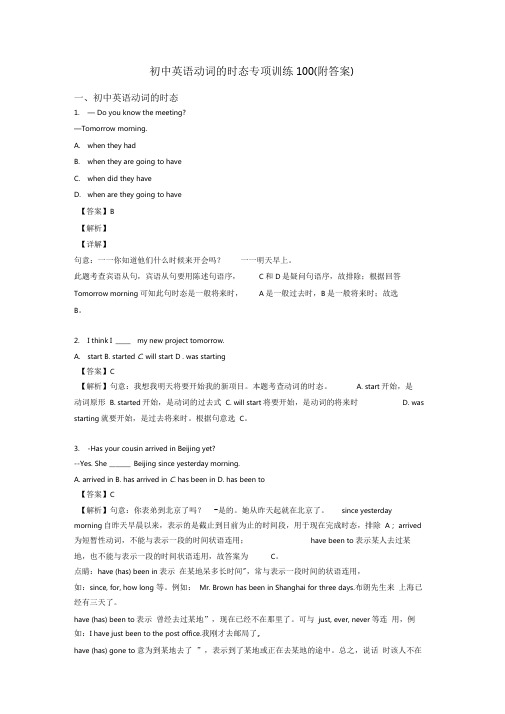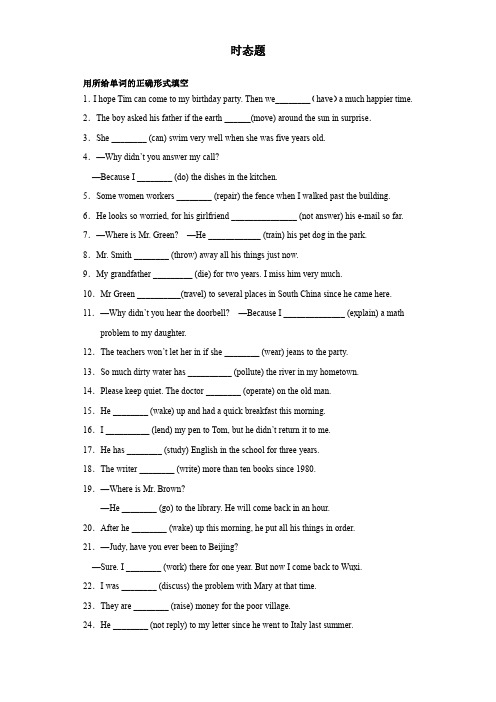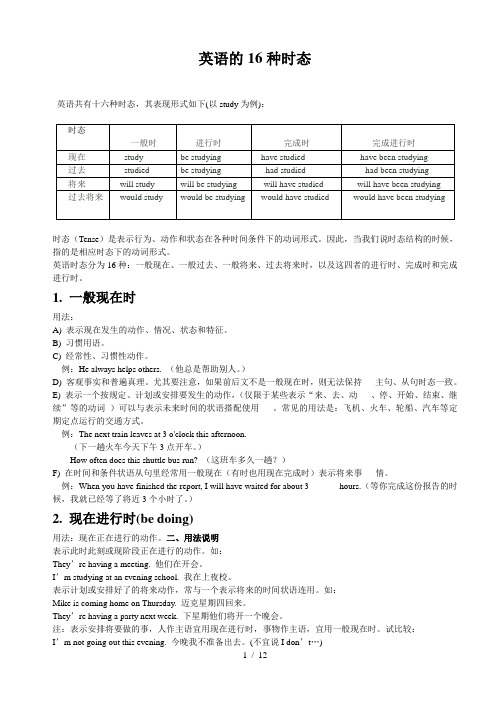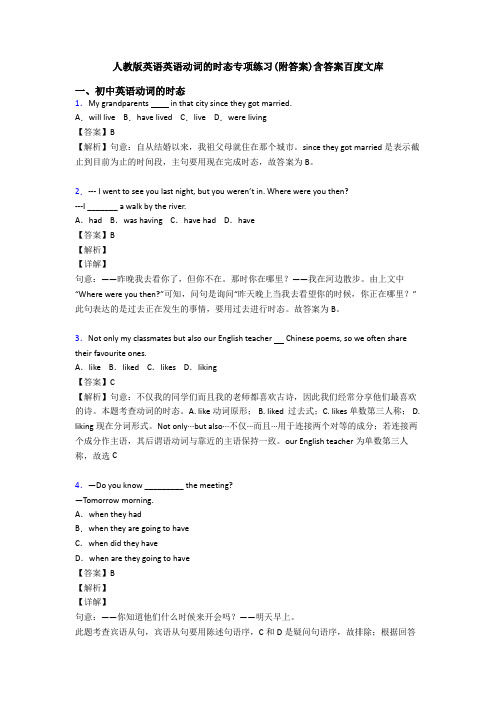英语时态练习题-附答案和讲解
初中英语动词的时态专项训练100(附答案)

初中英语动词的时态专项训练100(附答案)一、初中英语动词的时态1.— Do you know the meeting?—Tomorrow morning.A.when they hadB.when they are going to haveC.when did they haveD.when are they going to have【答案】B【解析】【详解】句意:一一你知道他们什么时候来开会吗?一一明天早上。
此题考查宾语从句,宾语从句要用陈述句语序,C和D是疑问句语序,故排除;根据回答Tomorrow morning可知此句时态是一般将来时,A是一般过去时,B是一般将来时;故选B。
2.I think I _____ my new project tomorrow.A.startB. startedC. will start D . was starting【答案】C【解析】句意:我想我明天将要开始我的新项目。
本题考查动词的时态。
A. start开始,是动词原形 B. started开始,是动词的过去式 C. will start将要开始,是动词的将来时 D. was starting就要开始,是过去将来时。
根据句意选C。
3.-Has your cousin arrived in Beijing yet?--Yes. She _______ Beijing since yesterday morning.A. arrived inB. has arrived inC. has been inD. has been to【答案】C【解析】句意:你表弟到北京了吗?-是的。
她从昨天起就在北京了。
since yesterday morning自昨天早晨以来,表示的是截止到目前为止的时间段,用于现在完成时态,排除A; arrived 为短暂性动词,不能与表示一段的时间状语连用;have been to表示某人去过某地,也不能与表示一段的时间状语连用,故答案为C。
初中英语时态练习题+附答案解析

一.用括号中动词的适当的形式填空.1.The boy is happy because he ___________(sell) out all the newspapers。
2.The plan _____________(give) up because of rain。
3。
we ________ (not go) climbing the hills if it rains tomorrow。
4.Where ____________you____________(be) these days?5.Where is Tom? He _________(go)to the post office. He said he _________(come) back soon.6.Mike says he _________(want )to be a worker after he _________ (finish )school.7.The last bus ____________just ________(leave)when they ________(get) to the bus stop。
8.She _________(not go)to bed until she _______(finish) her work。
9.Light ___________(travel )much faster than sound.10.I __________(feel)much better after I _______(take) the medicine.11.”Where ________we________(meet)?” “Let’s meet outside the park gate.”12.I_________(be)afraid Mr Johnson __________(not visit)out school tomorrow。
中考时态题(附答案和解析)

时态题用所给单词的正确形式填空1.I hope Tim can come to my birthday party.Then we________(have)a much happier time. 2.The boy asked his father if the earth______(move)around the sun in surprise.3.She________(can)swim very well when she was five years old.4.—Why didn’t you answer my call?—Because I________(do)the dishes in the kitchen.5.Some women workers________(repair)the fence when I walked past the building. 6.He looks so worried,for his girlfriend_______________(not answer)his e-mail so far. 7.—Where is Mr.Green?—He____________(train)his pet dog in the park. 8.Mr.Smith________(throw)away all his things just now.9.My grandfather_________(die)for two years.I miss him very much.10.Mr Green__________(travel)to several places in South China since he came here. 11.—Why didn’t you hear the doorbell?—Because I______________(explain)a math problem to my daughter.12.The teachers won’t let her in if she________(wear)jeans to the party.13.So much dirty water has__________(pollute)the river in my hometown. 14.Please keep quiet.The doctor________(operate)on the old man.15.He________(wake)up and had a quick breakfast this morning.16.I__________(lend)my pen to Tom,but he didn’t return it to me.17.He has________(study)English in the school for three years.18.The writer________(write)more than ten books since1980.19.—Where is Mr.Brown?—He________(go)to the library.He will come back in an hour.20.After he________(wake)up this morning,he put all his things in order. 21.—Judy,have you ever been to Beijing?—Sure.I________(work)there for one year.But now I come back to Wuxi.22.I was________(discuss)the problem with Mary at that time.23.They are________(raise)money for the poor village.24.He________(not reply)to my letter since he went to Italy last summer.25.My parents_________(fly)to Beijing last Saturday.They_________(come)back next week.26.The man________(become)rich when he was forty.27.All of them were________(sleep)at home when the flood came.28.Light_________(travel)much faster than the sound.29.Her father_______________(buy)her a nice present on her next birthday.30I promise I________________(send)you an email to explain all of these tomorrow.时态填空题答案一、用所给单词的正确形式填空1.I hope Tim can come to my birthday party.Then we________(have)a much happier time.【答案】will have【详解】句意:我希望蒂姆能参加我的生日派对。
英语时态语态练习(含详解答案)

英语时态语态练习题(附答案)stepped into the office,_____down and began to fill in the forms.sit itsaid she would telephone but we _____from her so far.’t heard’t hear ’t heard ’t hearI got to the cinema,thefilm____for ten minutes.begun begun been on’ll go with you as soon as I____my homework./ finish finishingit_____tomorrow,Iwon’t go to the cinema./ rain rainingis going to be a nurse when she_____up./ going to grow 下列四句是“这本书我已经买了三个月了。
”的英译文,哪一种不对/ have had this book for three months./ have bought this book for three months./ bought this book three months is three months since I bought this book.8.——Come in,Peter,I want to show you something.——Oh,how nice of you!I_____you_____to bring me a gift./;are going ;were going/’tthink;were going ’tthought;were goingI was at college I_____three foreign languages,butI_____all except for a few words of each./;had forgotten ;;had forgotten ;have forgottenpolice found that the house_____and a lot of things____./ broken into;has been stolen broken into;had been been broken into; been broken into;stolenvolleyball macth will be put off if it____./ rain rainingdress when she cut her finger./ making makingwhen Miss Brown went to get a book she_____in the office./;;has left ;had left ;had left14.——Have you moved into the new house——No yet,the rooms_____,/ being painted painted being painting15.——We haven’t heard from Jane for a long time.——What do you suppose____to her/ happening happen happened happened16.——Do you know our town at all——No,this is the first time I _____here./ been coming17.——We could have walked ot the was so near.——Yes,Ataxi_____at all necessary./’’t been ’t be ’t becity noises_____fromincreasing,people_____shout to be heard even at the dinner table 20 years from now./ not kept;will have to not kept;have not keep;will have to not keep;have tothe house when no one_____./;was looking ;;had looked ;lookedlast time I_____Janeshe____cotton in the fields./;was picking ;;;was pickingwere all surprised when he made it clear that he_____office soon./ leave leftsome parts of the world,tea_____with milk and sugar./ serving served pen I____I ____is on my desk,right under my nose./;;had lost ;had lost ;have lost24.——How long____each other before they____married——For about a year./ they known; they know;were going to they know;are going to get they known;gothave looked for it everywhere but still____it./;don’t find missing;don’;haven’t found missing;haven’t found26.——Can I join the club,Dad——You can when you____a bit older./ get getting have got27.——I’m sorry to keep you waiting.——Oh,not at only a few minutes./ been been be28.——Do you like the material——Yes,it_____very soft./ feeling feltdon’t really work the new secretary arrives./ help out just helped outjust helping out completedneed one more stamp before my collection_____./ completed been completed completed31.——Your phone number againI____quite catch it.——It’s 9568442./’’’’t32.——_____the sports meet might be put off.——Yes,it all depends on the weather./’ve been told ’ve told ’m told told,Granny____asleep./;was falling ;;was falling ;felldon’t need to describe her,I____hersevral times./ met met don’t think Jim saw me;he____into space./ stared staring just stared just stared36.——____my glasses——____Yes,I saw them on your bed a minute ago./ you see you seen you see you seenkeys in the office so she had to wait until her husband____home./;;had come ;;would comefirst met Lisa three years ____at a radio shop at the time./ worked working been working worked39.——Who is Jerry Cooper——_____I saw you shaking hands with him at the meeting./’t you meet him yet ’t you meet him 't’ you meet him yet ’t you met him yet40.——Alice,why didn’t you come yesterday——I____,but I had an unexpected visitor./ going toChinese Communist Partty_____in Shanghai in 1921./ found foundedmy home town since liberation./ been taken place taken place taken placewater will be further polluted unless some measures_____./ be taken taken taken been taken’ll be an astronaut by the time he_____thirty./ been be going to beon his face suggested that he____that./;hadn’t expected ;hadn’;would expect ;shouldn’t expect【试题解析】1.选C。
英语16种时态及练习题附答案

英语的16种时态英语共有十六种时态,其表现形式如下(以study为例):时态(Tense)是表示行为、动作和状态在各种时间条件下的动词形式。
因此,当我们说时态结构的时候,指的是相应时态下的动词形式。
英语时态分为16种:一般现在、一般过去、一般将来、过去将来时,以及这四者的进行时、完成时和完成进行时。
1. 一般现在时用法:A) 表示现在发生的动作、情况、状态和特征。
B) 习惯用语。
C) 经常性、习惯性动作。
例:He always helps others. (他总是帮助别人。
)D) 客观事实和普遍真理。
尤其要注意,如果前后文不是一般现在时,则无法保持主句、从句时态一致。
E) 表示一个按规定、计划或安排要发生的动作,(仅限于某些表示“来、去、动、停、开始、结束、继续”等的动词)可以与表示未来时间的状语搭配使用。
常见的用法是:飞机、火车、轮船、汽车等定期定点运行的交通方式。
例:The next train leaves at 3 o'clock this afternoon.(下一趟火车今天下午3点开车。
)How often does this shuttle bus run? (这班车多久一趟?)F) 在时间和条件状语从句里经常用一般现在(有时也用现在完成时)表示将来事情。
例:When you have finished the report, I will have waited for about 3 hours.(等你完成这份报告的时候,我就已经等了将近3个小时了。
)2. 现在进行时(be doing)用法:现在正在进行的动作。
二、用法说明表示此时此刻或现阶段正在进行的动作。
如:They’re having a meeting. 他们在开会。
I’m studying at an evening school. 我在上夜校。
表示计划或安排好了的将来动作,常与一个表示将来的时间状语连用。
如:Mike is coming home on Thursday. 迈克星期四回来。
(英语)初中英语动词的时态专项训练100(附答案)及解析

英语)初中英语动词的时态专项训练100(附答案)及解析一、初中英语动词的时态1.—Let ' s go for a picnic if it _______ tomorrow.—But nobody knows if it ______ tomorrow.A.won' t rain; rains B.doesn 't rain; will rainC.doesn ' t rain; rains. D.won' t rain; will rain【答案】B【解析】【详解】句意:——如果明天不下雨,我们就去野餐吧。
——但是没有人知道明天会不会下雨。
根据句意可知,第一个if 是“如果”的意思,引导的是条件状语从句,if 引导的条件状语从句的时态用一般现在时态表示将来,排除A,D选项;第二个if 是“是否”的意思,引导的是宾语从句,根据时间状语tomorrow 判断,从句的时态为一般将来时态,故答案为B。
2.—There are so many swimmers swimming in the swimming pool.—Yes, and sixty percent _ children.A.is B.are C.was D.were【答案】B【解析】句意:——在游泳池里有那么多游泳者正在游泳。
——是的,而且百分之六十是孩子。
根据谓语are 可知此处用一般现在时,故排除CD两项。
此处的sixty percent 代指的是百分之六十的游泳者,故谓语用复数形式,故选B。
3.Andy doesn ' t want to see the film Coco because h e it twice.A.sees B.is seeing C.will see D.has seen【答案】D【解析】【详解】句意:Andy 不想看《寻梦环游记》这部电影,因为他已经看过两次了。
人教版英语英语动词的时态专项练习(附答案)含答案百度文库

—Oh, I didn’t see it, either. I’m afraid you ___________ it.
A.are losingB.will loseC.have lostD.were losing
【答案】C
【解析】
句意:——妈妈,我的字典在哪里?——哦,我也没有看到它,恐怕你把它弄丢了。A. are losing现在进行时态;B. will lose一般将来时态;C. have lost现在完成时态;D. were losing过去进行时态。lose这一动词发生在过去,造成的结果是现在看不见了,属于完成的动作,要用现在完成时态来表达,故答案为C。
9.– Don’t worry! I’m sure your son will arrive safely.
-- But if he ______, what can I do? It’s getting dark and it’s going to rain.
2.--- I went to see you last night, but you weren’t in. Where were you then?
---I _______ a walk by the river.
A.had B.was having C.have had D.have
【答案】B
一Yes. Ithere many times.
A.went; have been B.have gone; went
C.went; have gone D.have been;went
【答案】A
【解析】句意:-桂林是个很棒的地方。我多年前去过那里。-是的。我去过那里很多次。many years ago很多年前,跟一般过去时态连用,所以谓语动词使用go的过去式went。下文表示过去的动作对现在造成的影响与结果,所以谓语动词使用现在完成时态,have/has+动词的过去分词,have/has been to.. ,意为“曾经去过某地”,有“去过某地”的经历; have/has gone to…,意为“去了某地”,人不在说话地点。本句表示“曾经去过某地”。故选:A。
【英语】英语动词的时态专项训练100(附答案)及解析

A.won’t rain; rainsB.doesn’t rain; will rain
C.doesn’t rain; rains.D.won’t rain; will rain
【答案】B
【解析】
【详解】
句意:——如果明天不下雨,我们就去野餐吧。——但是没有人知道明天会不会下雨。根据句意可知,第一个if是“如果”的意思,引导的是条件状语从句,if引导的条件状语从句的时态用一般现在时态表示将来,排除A,D选项;第二个if是“是否”的意思,引导的是宾语从句,根据时间状语tomorrow判断,从句的时态为一般将来时态,故答案为B。
17.Don’t go out! It __________now.
A.rains B.will rain C.is raining D.was raining
【答案】C
【解析】句意:不要出去了,现在在下雨。根据now可知用现在进行时态;故选C
18.Listen, someone ______ in the room.
10.– Would you like to watch The Great Wall《长城》with me?
-- Certainly. I don’t mind ________ it again although I ______ it twice.
A.to see, saw B.seeing, have seen C.to see, have seen D.seeing, saw
11.If our governmentpay attention to the safety of food, our healthin danger.
- 1、下载文档前请自行甄别文档内容的完整性,平台不提供额外的编辑、内容补充、找答案等附加服务。
- 2、"仅部分预览"的文档,不可在线预览部分如存在完整性等问题,可反馈申请退款(可完整预览的文档不适用该条件!)。
- 3、如文档侵犯您的权益,请联系客服反馈,我们会尽快为您处理(人工客服工作时间:9:00-18:30)。
1. Sales of CDs have greatly increased since the early 1990s, when people ________ to enjoy the advantages of this new technology.A. beginB. beganC. have begunD. had begun2. Turn on the television or open a magazine and you ________ advertisements showing happy families.A. will often seeB. often seeC. are often seeingD. have often seen3. —I hear Jane has gone to the Holy Island for her holiday.—Oh, how nice! Do you know when she ________?A. was leavingB. had leftC. has leftD. left4. —What were you doing when Tony phoned you?—I had just finished my work and________ to take a shower.A. had startedB. startedC. have startedD. was starting5. I ________ you not to move my dictionary—now I can’t find it.A. askedB. askC. was askingD. had asked6. —Has Sam finished his homework today?—I have no idea. He ________ it this morning.A. didB. has doneC. was doingD. had done7. —What’s that terrible noise?—The neighbors ________ for a party.A. have preparedB. are preparingC. prepareD. will prepare8. Now that she is out of a job, Lucy ________ going back to school, but she hasn’t decided yet.A. had consideredB. has been consideringC. consideredD. is going to consider9. The teacher, with 6 girls and 8 boys of her class, ________ visiting a museum when the earthquake struck.A. wasB. wereC. had beenD. would be10. The discussion ________ alive when an interesting topic was brought in.A. was comingB. had comeC. has comeD. came11. Because the shop ________ , all the T-shirts are sold at half price.A. has closed downB. closed downC. is closing downD. had closed down12. Let’s keep to the point or we ________ any decisions.A. will never reachB. have never reachedC. never reachD. never reached13. My mind wasn’t on what he was saying so I’m afraid I ________ half of it.A. was missingB. had missedC. will missD. missed14. It is said in the book that Thomas Edison (1847—1931) ________ the world-leading inventor for sixty years.A. would beB. has beenC. had beenD. was15. —You were out when I dropped in at your house.—Oh, I ________ for a friend from England at the airport.A. was waitingB. had waitedC. am waitingD. has waited16. She has set a new record, that is, the sales of her latest book ________ 50 million.A. have reachedB. has reachedC. are reachingD. had reached17. He kept looking at her, wondering whether he ________ her somewhere.A. sawB. has seenC. seesD. had seen18. The crazy fans ________ patiently for two hours and they would wait till the movie star arrived。
A. were waitingB. had been waitingC. had waitedD. would wait19. She ________ her hairstyle in her hometown before she came to Chongqing for a better job.A. would changeB. has changedC. changedD. was changing20. The first use of atomic weapons was in 1945, and their power ________ increased enormously ever since.A. isB. wasC. has beenD. had been21. —You haven’t said a word about my new coat, Brenda. Do you like it?—I’m sorry I ________ anything about it sooner. I certainly think it’s pretty on you.A. wasn’t sayingB. don’t sayC. won’t sayD. didn’t say22. All morning as she waited for the medical report from the doctor, her nervousness ________.A. has grownB. is growingC. grewD. had grown23. Why don’t you put the meat in the fridge? It will ________ fresh for several days.A. be stayedB. stayC. be stayingD. have stayed24. How can you possibly miss the news? It ________ on TV all day long.A. has beenB. had beenC. wasD. will be25. -Sorry to have interrupted you. Please go on.-Where was I?-You ________ you didn’t like your father’s job.A. had saidB. saidC. were sayingD. had been saying26. I arrived late; I ________ the road to be so icy.A. wouldn’t expectB. haven’t expectedC. hadn’t expectedD. wasn’t expecting27. I ________ while reading the English textbook. Luckily, my roommate woke me up in time!A. had fallen asleepB. have fallen asleepC. fell asleepD. fall asleep28. Although he has lived with us for years, he _______ us much impression.A. hadn’t leftB. didn’t leaveC. doesn’t leaveD. hasn’t left29. I ________ ping-pong quite well, but I haven’t had time to play since the new year.A. will playB. have playedC. playedD. play30. I wonder why Jenny ________ us recently. We should have heard from her by now.A. hasn’t writtenB. doesn’t writeC. won’t writeD. hadn’t written31. A short time before she ________ , the old lady ________ a will, leaving all her money to her brother.A. died; has writtenB. has died; wroteC. had died; wroteD. died; had written32. —Kate doesn’t look very well. What’s wrong with her?—She has a headache because she ________ too long; she ought to stop work.A. has been readingB. had readC. is readingD. was reading33. As time ________ on, Sally began to wonder if Bruce ________ Bilks’new poem called Tabled’Hute.A. has gone; had readB. went; has readC. goes; has readD. went; had read34. —Mike, do you know who wanted me on the phone?—Sorry. I don’t know. I ________ a bath in the bathroom.A. have hadB. was havingC. hadD. am having35. —Could you tell me how your father usually goes to work?—Yes. If it is fine, he ________ to his office.A. will walkB. will go on footC. walksD. would go on foot36. — I called you at ten, but there was no reply.—Oh, that was probably when I ________ a shower.A. am takingB. tookC. were to takeD. was taking37. — Have you ever worked with a tape recorder?—I ________ it a lot when I was studying French in school.A. usedB. was usedC. have usedD. had used38. —You must have met him the other day. —Oh, no, I ________ .A. hadn’tB. mustn’tC. haven’tD. didn’t39. —Which flight ________ ? —I want to catch the 13:00.A. you are to catchB. are you catchingC. do you catchD. have you caught40. —Excuse me, sir. Would you do me a favor?—Of course. What is it?—I ________ if you could tell me how to fill out this form.A. had wonderedB. was wonderingC. would wonderD. did wonder41. How can I ever concentrate (集中精力) if you ________ continually ________ me with silly questions?A. have…interruptedB. had ...interruptedC. are…interruptingD. were…interrupting42. —I bought this shirt for 35 yuan yesterday.—It’s on sale today for only 29. You should have waited.—Oh, really? But how ________ I know?A. wouldB. canC. didD. do43. —Will you go now? (from )—Not until I ________ my experiments.A. will finishB. have finishedC. will have finishedD. had finished44. —Look! Someone has spilt coffee on the carpet.—Well, it ________ me.A. isn’tB. hasn’t beenC. hadn’t beenD. wasn’t45. —Did you enjoy your holiday?—Yes, it’s the best holiday I ________ these years.A. hadB. have hadC. had hadD. would have46. I don’t understand how you got a ticket. I always ________ you ________ a careful driver.A. think; areB. am thinking; areC. thought; wereD. think; were47. I really ought to go on a diet。
